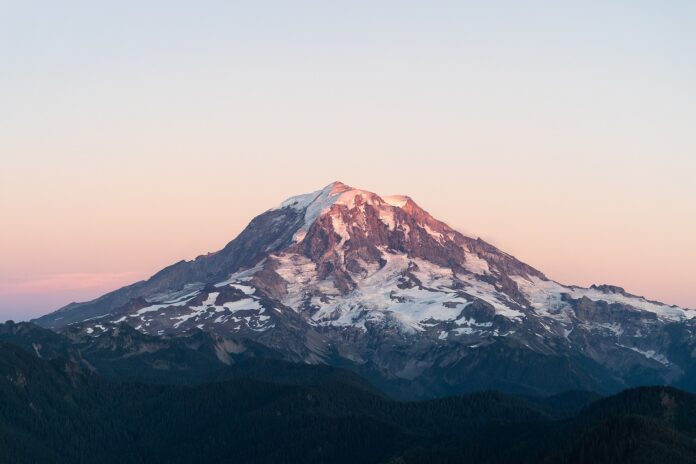
BY HARRY WEEKES
In the beginning of March, I spent five days on Bainbridge Island, Washington, visiting a school. Going from snow-covered, cold and clear Idaho to a sodden, drizzly Pacific Northwest in the span of four hours of traveling had its own kind of disorientation. I don’t know that I am ever going to get accustomed to how quickly and completely we can change environments.
The big differences, of course, are one thing. Everything on Bainbridge was SO green. And the trees? First of all, the entire place is a forest, and they let this forest grow right up to the edge of the road. Navigating this tunnel of trees in the fading light made me realize how this almost never happens to me in Idaho, where we keep our trees at a proper distance from the highway. Then, add a volcano. I simply cannot believe everyone in and around Seattle isn’t constantly looking at Mount Rainier and saying, “That’s a volcano!” Finally, throw in the cold saltwater of the Pacific as it has crept into Puget Sound, and fill it with things like Orcas, a mammal so matched to its environment that they seem obvious, and pretty quickly Country Mouse Harry is oohing and aahing.
But the big differences are just that—the big differences. The obvious ones. The ones that don’t sneak up on you and don’t trigger any kind of major shift in attention or perception. They are the ones that pretty quickly fade into the background.
It is the little differences that do something else to your mind.
In the spring, my students and I turn our attention to ornithology, spending 11 weeks “getting our bird on.”
Nicely, getting your bird on in March in the Wood River Valley is about familiarizing yourself with a small group of birds — magpies, chickadees, crows, various ducks — in anticipation of the coming migrants.
We warm up to birds, learning the big differences — size and shape, habitat, which birds walk along the edge of the pond, and which flit about the willow branches. The little things are present, too — the shape of the bill, the markings on the head, the incessant and incomprehensible chatter that tells us spring is coming.
It is this chatter — the voices of birds, their songs, their conversations — that perks my ears the most on Bainbridge. Something is just a little bit different. Like hearing a “y’all” from someone, or that suite of sounds that makes you realize a person is from the Midwest. Like people, the dialects of birds are different, too.
The sounds are similar enough that they force a question, even as I am looking at one of the most familiar and common birds around. “That’s a robin, right?” And it is the same for the other birds — the juncos, the crows, and the towhees. They all sound the same… just a little bit different. Just subtle enough to draw out a very different kind of attention.
I imagine this to be some kind of evolutionary thing. You walk into the long grass and the fact that there are no trees, that there is a volcano in the background, that the big things remain consistent, well, you just keep on walking. But that little flash of something in the grass? That very slightly different pattern of something in the bushes? That little creak of noise? Maybe stop walking. Pay attention to those little things.
So there I am, paying attention to those little things, looking at and listening to a woodpecker that I confirm to passersby, “It’s a flicker!”
They pull their raincoats a little closer and walk a little faster. I think that’s because of the rain.
Harry Weekes is the founder and head of school at The Sage School in Hailey. This is his 52nd year in the Wood River Valley, where he lives with Hilary and one of their three baby adults—Simon. The other members of the flock are Georgia and Penelope (Georgia recently fledged from Davidson College in North Carolina and Penelope is at Middlebury College in Vermont).


